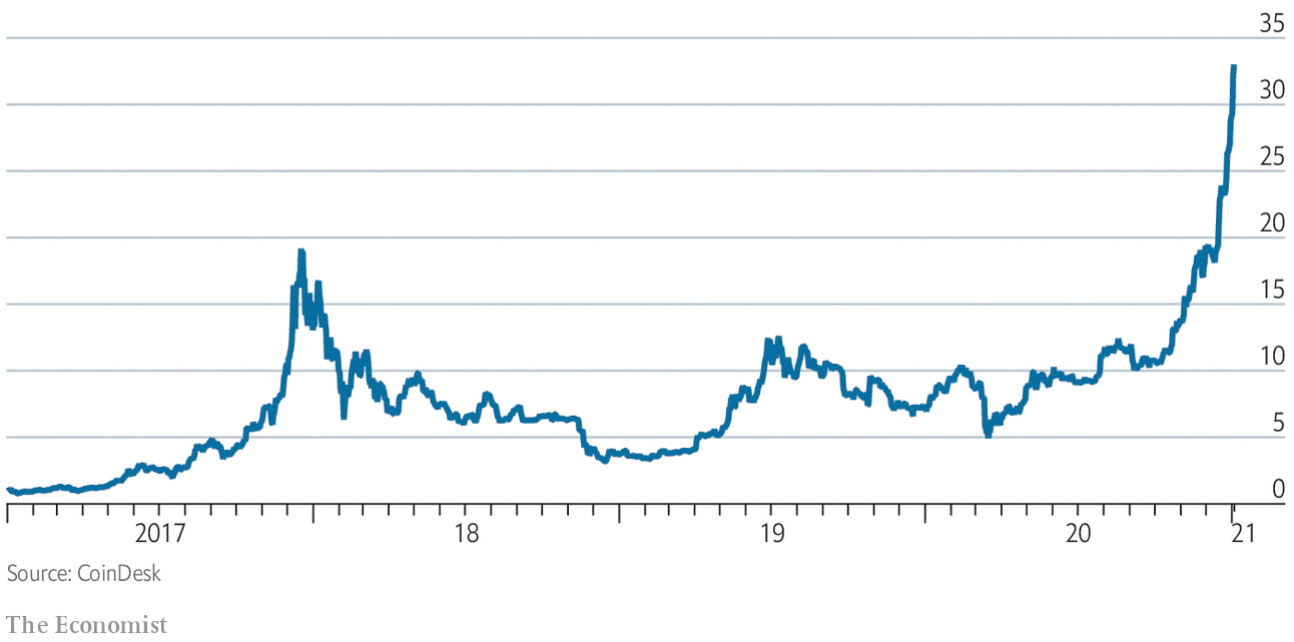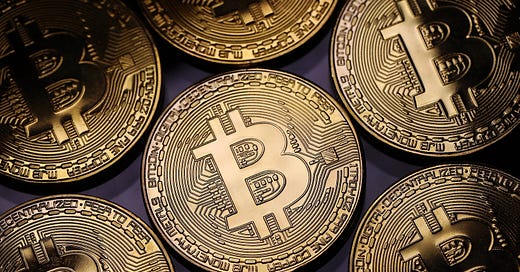A funny thing happened one evening to Yaya Fanusie, a teacher of mathematics turned CIA analyst, who now specializes as a consultant on money laundering and cryptocurrency. He was giving a speech to large institutional investors about crypto. He asked for a show of hands from the audience: “Who here owns cryptocurrency?”
Not a single person in the audience raised their hands.
However, also in that room were the waitstaff—and every single one of them raised their hands.
I had a similar experience in 2019 while getting a computer repaired at a small computer repair store. “Do you do anything with cryptocurrency?” I asked the repair guy, out of curiosity. The fellow, a white man in his early 20s, looked around, before replying, “Oh yes. Helium [coin] is going to replace bitcoin.” I remember that part exactly. After that he followed with a disquisition about there being servers in the forest behind Pawleys Island, South Carolina, and then something about the US government being unable to stop the crypto movement.
He spoke in the complicated, convoluted way that I first became familiar with when I lived in LA and contact with scientologists was a commonplace. I suppose the best way to describe it would be the hushed tones of someone who, after spending a lot of time on the internet, believes they have stumbled into grave national security secrets. I was not surprised when this gentleman told me that he was . . . familiar . . . with Qanon.
This was a couple of years ago, when cryptocurrency had been written off for dead, and being for freaks and scammers. Before COVID. Before January 6.
But it was smack-dab in the middle of a multi-year attack on the faith in government by a lawless and reckless sitting president.
To put it plainly: I suspect that our current moment of crypto ascent was made possible by the conservative movement and the man who hijacked it.
Blockchain technology has been around since the 1980s. Bitcoin, the most famous cryptocurrency, has been around since 2008.
But it was only in 2017 that bitcoin jumped to a level where everyone from pension fund managers to ordinary citizens took notice. It's not abnormal for new technology to attain a high relative value to existing technology. Bitcoin wasn’t “new,” though. In late 2016 —right around when Donald Trump was securing the Republican nomination—the price of bitcoin began rapid appreciation, which jumped with Trump’s victory and inauguration. In May of 2017, bitcoin’s curve went vertical.

You can tell yourself a just-so story about this coincidence. How the same anti-establishment voters Trump brought into politics suddenly became bullish on anti-establishment “currency,” too. But maybe it’s more than a just-so story.
Conservatives have long held a fetish for the collapse of the federal government. (It’s the mirror image of how liberals romantically imagine that government must play a helpful, important role in every aspect of society.) It is not, for instance, an accident that every other commercial on Fox and talk radio is an advertisement encouraging people to buy gold. And while sophisticated investors may own gold as a perceived hedge against inflation, they do not typically own it in physical forms. (And they definitely don’t own it in commemorative Trump coins.)
Shockingly, according to a Harris poll, almost 1 in 10 people claimed that they spent part of their Trump-signed stimulus checks on crypto. That’s just the number of people who were willing to tell a pollster that despite being qualified as in financial distress, they spent their money on a highly-speculative asset class.
Just some back-of-the-envelope math: 159,000,000 stimulus checks were sent out. Let's pretend that all of them went to households, so the number of actual people this represents gets cut in half. That’s 79,000,000 individual recipients; 10 percent of that is, 7,900,000 people. Who bought cryptocurrency.
Another coincidence: 7.9 million is also close to Biden’s popular vote margin. Crypto voters are now a thing.
Joe Bidens margin of victory in Arizona, just to pick a state at random—was 10,457 votes. It is not unreasonable to assume that given the adoption of crypto, there are 10,500 voters for whom cryptocurrency is the central issue in Arizona.
Out of the primordial distrust stew of 2017 there emerged a group of people who view themselves as “bitcoin maximalists.” These were guys who were pumping bitcoin on the internet and as per the new normal of social media, the loudest and the craziest made the leap from Twitter to CNBC. (Here’s a guy tearing up money on CNBC.) Back then, the central case for bitcoin was that the actions of the Fed made the impending collapse of the dollar a certainty. Rooting for bitcoin meant rooting for the failure of the US government. Now the anti-anti’s are lining up to curry favor with the bitcoin maximalists. Texas is welcoming energy intensive bitcoin mining with open arms. Remember, it's likely that about 7,900,000 have a financial interest in this stuff now--maybe they don’t care as much about voter suppression laws as they do the price of bitcoin.
As a mode of thought, “In a world where the dollar is collapsing, the government is collapsing, and only bitcoin can save you,” aligns nicely with “I alone can fix it.”
Maybe it wasn’t a coincidence at all.




